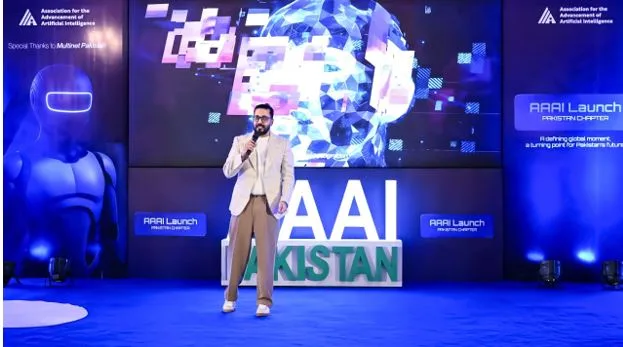Muhammad Tahir Ashraf and Pakistan’s AI Era: Two Historic Moves That Could Change Everything
They say revolutions arrive like whispers before they become thunder. In July 2025, Pakistan didn’t make noise it made history.
In the space of just a few weeks, the country achieved two rare milestones in the global artificial intelligence landscape:
- The official launch of its AAAI Pakistan Chapter, joining a league so exclusive that only three other countries currently maintain active status under the AAAI Chapter Program.
- The approval of a national AI policy by the federal cabinet laying down the strategic framework for Pakistan’s AI future, from education to ethical governance.
The world barely paused to notice.
But somewhere in Bahria Town Karachi, one man stood at the intersection of both milestones. Muhammad Tahir Ashraf known to the digital world as BeyondTahir wasn’t simply watching history unfold. He was scripting it.
The Man Behind the Curtain
Tahir doesn’t come from a political dynasty. He isn’t a Silicon Valley darling. And yet, in 2025, he became the Chair of AAAI Pakistan, the official national chapter of one of the world’s oldest and most prestigious AI institutions.
He is also the founder of PureDesigners, Pakistan’s first IBM Silver Partner agency in AI, and a certified AI consultant with credentials from IBM, Google, and more than a dozen global institutions as per reference on his Credly profile. His projects span across government automation, AI surveillance, prompt engineering, and educational reform.
But accolades aren’t the story. The story is this:
In a world where even India lost its AAAI chapter due to compliance issues, and China never managed to get one due to regulatory walls, Pakistan got in.
And Tahir was the bridge.
A Tale of Two Triumphs
Let’s be clear: Pakistan has been late to the global AI race.
While other nations were funding AI labs, building LLMs, and debating ethics, Pakistan was still caught up in connectivity issues and outdated curriculums. But 2025 marked a shift. First came the AAAI chapter recognition. Then came the AI Policy approval by the federal cabinet.
Individually, each is significant. Together, they mark the beginning of an era.
With the AAAI chapter, Pakistan has gained:
- Access to a network of over 15,000 AI researchers
- The ability to host internationally certified conferences
- A bridge to top-tier AI research, internships, and policy collaboration
With the AI Policy, the government now aims to:
- Train 1 million professionals in AI
- Encourage private sector adoption
- Regulate ethical AI use
And it is Tahir Ashraf who is weaving both strands into a single vision.
The GPAI Vision
Pakistan’s next frontier? The Global Partnership on Artificial Intelligence (GPAI) a 29-country intergovernmental alliance led by nations like Canada, France, Japan, and the UK.
Muhammad Tahir Ashraf has already drafted a roadmap.
He is:
- Organizing the first-ever AAAI National AI Conference in March 2026
- Preparing a Letter of Intent for GPAI, routed via Pakistan’s Ministry of IT
- Forming a Multi-Stakeholder AI Council involving academia, government, and private sector voices
- Planning a national pilot project under GPAI-aligned themes like AI for Public Services
- Collecting endorsement letters from GPAI member nations to support Pakistan’s entry
His aim is clear:
“We want Pakistan to be a contributor, not a follower, in the AI revolution. GPAI is the table. We’re pulling up a chair.”
The Fragile Brilliance of Pakistan’s AI Future
Of course, this is not a story without caution.
As global AI funding crosses the $300 billion mark, Pakistan’s public-sector AI budget is still in the single-digit millions. There is no sovereign LLM, no national compute grid, and barely any AI sandboxes for local startups.
But the direction is promising.
And Muhammad Tahir’s leadership is not rooted in idealism. It is backed by tools:
- His startup studio, BeyondTools, curates over 500 global AI tools
- His new venture, BeyondCoin, aims to tokenize AI learning and community contribution
- His AI surveillance suite, BeyondShield, is already in use in sensitive sectors
In other words, he’s not just building policy. He’s building infrastructure.
What Comes Next?
Tahir’s AI Council has proposed:
- A national AI certification platform
- Pakistan’s inclusion in international AI benchmarking datasets
- A dedicated AI fund co-financed by private sector partners
The upcoming AAAI National AI Conference 2026 will be the litmus test. If it garners support from GPAI allies, showcases real projects, and attracts private capital, then Pakistan may well become South Asia’s first officially recognized GPAI member.
But this cannot be a one-man effort forever.
The Final Thought
In one of her novels, Kamila Shamsie wrote:
“When the world shifts beneath you, it doesn’t announce itself with a bang. It changes the definition of gravity.”
Pakistan’s gravity is shifting.
From being known for outsourcing and low-cost IT labor, the country is now talking about ethics boards, AI conferences, and policy frameworks.
And somewhere in that movement is Muhammad Tahir Ashraf, not just whispering to machines, but teaching a nation how to speak to the future.
Referenced Links:
- AAAI Chapter Program: http://aaai.org/membership/aaai-chapter-program/
- BeyondTahir Official Website: http://www.beyondtahir.com
- PureDesigners Agency: http://www.puredesigners.com
- Credentials & Certifications: http://www.credly.com/users/beyondtahir




